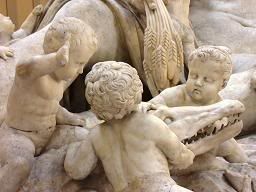It took me some time to retrieve the paragraphs that originally led me onto the path of philosophy. And, by chance, these very paragraphs also have something to do with the media reports of the last few weeks. Here is some of my school Latin, some Seneca: „Living happily, my dear brother Gallio, is something everybody wants; but when it comes to see what actually makes life a happy life, then the vision is clouded“.
 This is how Seneca starts in his letters to Lucilius. Among Seneca’s stories, the one that moved me most was that of Telesphoros of Rhodos. He had dared to anger his old friend and emperor Lysimachos and, if I remember correctly, courted his daughter. Lysimachos found this far from amusing and ordered his old friend taken prisoner, publicly exhibited in a cage and parts of his body cut off piecewise. Caught in his own excrements without eyes, ears and nose, Telesphoros was forced to crawl around like an animal.
This is how Seneca starts in his letters to Lucilius. Among Seneca’s stories, the one that moved me most was that of Telesphoros of Rhodos. He had dared to anger his old friend and emperor Lysimachos and, if I remember correctly, courted his daughter. Lysimachos found this far from amusing and ordered his old friend taken prisoner, publicly exhibited in a cage and parts of his body cut off piecewise. Caught in his own excrements without eyes, ears and nose, Telesphoros was forced to crawl around like an animal.
Finding himself in this inclement situation because of a crime that should by rights have resulted in love, Telesphoros always had the option of taking his own life. Yet, no matter how hard he suffered, he kept resisting that temptation. When someone advised him to put an end to it by starvation, Telesphoros replied: “As long as there is life, there is hope”.
Seneca, the Roman, found that clutching to life in such a manner undignified and, in the ancient Greek manner, stated that part of a good life is a good death. Telesphoros, on the other hand, reasoned that he appreciated life too much to let go of it.
Who was happier? The one who took his own life after having decided this was what he wanted, not because of weakness or agony? Or the one who persisted regardless of most intense agonies? What value did life have? And what had made it a happy life?
MB
(Translated by EG)
